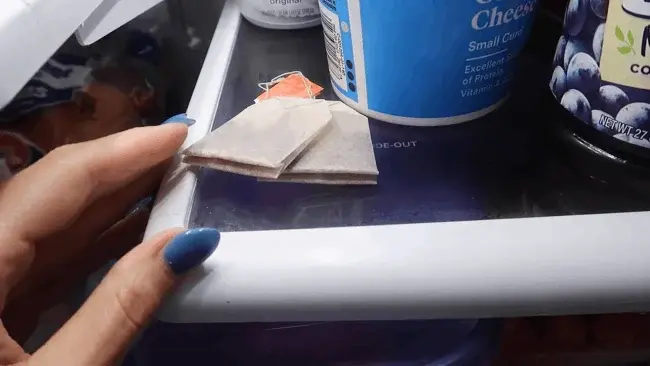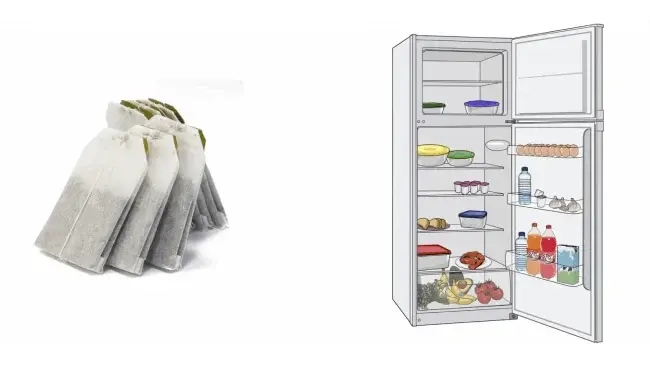Tea bags require careful storage to maintain their flavor and quality, and you might be wondering, “Can I store tea bags in the fridge?”
You can generally store tea bags in the refrigerator, but most of the time, it is best not to store them in the kitchen refrigerator.
While refrigeration can help prolong the freshness of certain types of tea, it’s not universally recommended for all teas. There’s a risk that tea bags will absorb odors from the fridge and that condensation will form when you bring them back to room temperature.
We will discuss in detail why it is not advisable to store tea bags in the refrigerator and what types of tea bags can be stored in the refrigerator.
Jump to Section
Can You Store Tea Bags in the Fridge: 3 Reasons Not to Do So

There are 3 reasons why storing tea bags in the refrigerator isn’t recommended.
- Odor absorption
- Condensation risk
- Unnecessary for some teas
1. Odor Absorption
You shouldn’t store tea bags in the fridge because they can absorb odors and affect the flavor of the tea. Tea is porous, meaning it can absorb odors from its surroundings.
If you store tea bags in the refrigerator, they can easily pick up the smells of other strongly aromatic items in the fridge, such as onions or garlic. These odors can then transfer to the tea, altering its taste and aroma.
2. Condensation Risk
If tea bags are stored in the refrigerator, the risk of condensation inside the packaging increases, potentially compromising the quality of the tea. This is due to the temperature difference between the cold environment of the fridge and the warmer room temperature when the tea bags are taken out.
When you remove the tea bags from the fridge and expose them to room temperature, moisture from the air can condense inside the packaging.
Moisture can seep into the tea leaves, causing them to become damp, lose their taste, and even develop mold.
Condensation can also affect the texture and aroma of the tea, making it less enjoyable to drink.
3. Unnecessary for Some Teas
Certain teas, such as black teas and roasted teas, do not require refrigeration. These types are less sensitive to temperature and humidity than other varieties.
These teas have undergone a more extensive oxidation process during production, making them more stable and less prone to spoilage.
Additionally, refrigeration can introduce excess moisture into the tea bags, leading to a loss of flavor and quality.
Therefore, for less moisture-sensitive teas, it’s best to store them in a cool, dark cabinet to maintain their freshness and preserve their delicate flavors.
Which Types of Tea Bags Are Most Suitable for Refrigerated Storage?
Certain types of tea bags are more suitable for refrigerated storage, particularly those that benefit from prolonged preservation and minimal exposure to air.
Here are some types of tea bags that are most suitable for refrigerated storage:
1. Matcha
In terms of refrigerated storage, matcha is one of the most delicate teas available. The high sensitivity of matcha to heat and humidity makes it prone to oxidation and flavor deterioration.
Therefore, it is important to store it properly to preserve its freshness and vibrant green color.
Using an airtight container is essential to prevent moisture and odors from affecting the tea. Additionally, storing matcha in the refrigerator can help extend its shelf life.
2. Japanese Steamed Green Teas
If you enjoy Japanese green teas like Gyokuro and sencha, refrigeration can be a great way to help preserve their unique flavor and aroma.
These teas are often lightly steamed, making them susceptible to heat and humidity damage.
By storing them in the refrigerator, you can help them retain their signature grassy taste and umami notes. Remember that these teas are best brewed at a lower temperature, so let them warm up to room temperature before brewing.
3. Herbal Teas
Herbal teas often contain various botanicals and can be particularly susceptible to flavor deterioration, especially if they are stored in a warm and humid environment.
That’s why refrigerating herbal teas can be a smart move if you want to prolong their shelf life and preserve their distinct flavors.
When storing herbal teas in the fridge, keep them in an airtight container to prevent any moisture from seeping in and damaging the tea. Let the tea come to room temperature before brewing.
4. Teas Infused With Oils or Fragrances
For teas that have been infused with essential oils or fragrances, storing them in the fridge can help prevent the volatile compounds from evaporating. This can help preserve the tea’s unique scent and flavor, allowing you to enjoy it for longer periods of time.
When storing these teas in the refrigerator, store them in an airtight container to prevent odors from other foods from affecting their aroma and flavor. Remember to let the tea reach room temperature before brewing to prevent the flavors from being muted by the chill.
How Do You Safely Store Tea Bags in the Fridge?
If you decide to store tea bags in the refrigerator, it’s important to do so safely to preserve their quality.

Step 1: Choose an Airtight Container and Place the Tea Bags Into It
Make sure you choose an airtight container and place your tea bags inside it. Choose an opaque container made of glass, metal, plastic, or ceramic.
The container should have a tight-fitting lid to ensure a proper seal. This will help to keep your tea bags fresh and prevent any outside odors or moisture from affecting the flavor of your tea.
Before placing the tea bags in the container, ensure they’re dry and at room temperature. Moisture can cause tea bags to clump together and lose their freshness.
Step 2: Seal the Airtight Container
Ensure you tightly seal the airtight container to maintain the freshness of your tea bags while storing them in the fridge.
The tight seal you create ensures that the delicate flavors and aromas of the tea are preserved.
To ensure maximum freshness, consider using moisture-absorbing packets inside the container.
These packets help maintain low humidity levels, further protecting the tea bags from moisture and potential spoilage.
Step 3: Label the Container
Use a waterproof marker to label your container with the type of tea and the date of storage to easily identify and keep track of the freshness of your tea bags.
You can easily find the flavor you desire without opening multiple containers if you indicate the type of tea, whether green, black, herbal or any other.
Step 4: Store in the Fridge
Now, carefully place the airtight container into the refrigerator. Be sure to select a section of the fridge that experiences minimal temperature fluctuations to maintain the tea’s freshness and prevent condensation within the container.
Alternatives to Refrigerating Tea Bags for Storage
If you prefer not to store your tea bags in the fridge, consider a few alternatives.
1. Airtight Containers
For optimal preservation, consider using airtight containers as an alternative to refrigerating your tea bags.
Storing tea bags in airtight containers helps protect them from light, heat, and moisture, which can degrade the quality and flavor of the tea.
Airtight containers create a barrier that prevents air from entering and moisture from escaping, keeping the tea bags fresh and flavorful for a longer period.
These containers come in various sizes and materials, such as glass, ceramic, or stainless steel, and provide an ideal environment for tea storage.
Choose a large container to accommodate your tea bags without overcrowding them, as this can lead to damage and loss of flavor.
Remember to keep the containers in a cool, dark place, away from direct sunlight and heat sources, to ensure the best preservation of your tea bags.
2. Vacuum-Sealed Bags
Consider using vacuum-sealed bags to keep your tea bags fresh without refrigeration. These airtight storage options are designed to remove air and create a seal that helps maintain the freshness of your tea.
Vacuum-sealed bags and containers prevent oxygen from entering, which can cause the tea to degrade and lose flavor over time.
FAQ’s: Can You Store Tea Bags in the Fridge
Many people have questions regarding the storage of tea bags in the kitchen refrigerator. Below are some questions that may also be on your mind.
How long can I safely store tea bags in the fridge?

You can safely store tea bags in the fridge for the long term, typically for periods of 2 months or longer. However, you have to be aware of potential contamination risks.
While excellent for preserving tea freshness, the refrigerator’s environment can expose your tea to various food odors that may affect its flavor.
To minimize this risk, ensure your tea bags are stored in airtight containers, separate from other foods, and consider using odor-absorbing packets within the containers.
Properly sealed, refrigerated storage can help extend the shelf life of delicate teas like matcha or Gyokuro while preserving their unique flavors.
How can I determine if my tea has gone bad after being stored in the fridge?
To determine if your tea is spoiled or has gone bad after being stored in the refrigerator, rely on your senses. Inspect the tea for any visible signs of mold, unusual discoloration, or off-putting texture.
Take a whiff of the tea; it may have deteriorated if it emits a musty or foul odor rather than its characteristic aroma.
Taste a small amount of the tea. If it has an unpleasant or rancid taste, it’s likely past its prime. If any of these indicators are present, it’s best to discard the tea, as consuming spoiled tea can result in an undesirable flavor experience.
Conclusion
While it may be tempting to store tea bags in the fridge for convenience, it isn’t the most suitable method for all types of tea. As we’ve explored, refrigeration can be beneficial for delicate teas like matcha and green varieties.
Some tea’s porous nature makes it susceptible to absorbing odors from the fridge, and the risk of condensation can compromise its quality. Airtight containers and a cool, dark cabinet provide an excellent alternative for less moisture-sensitive teas. The choice depends on the type of tea and your storage conditions.
If you follow these guidelines, you will ensure that every cup of tea you brew delivers its full, delightful flavor.





